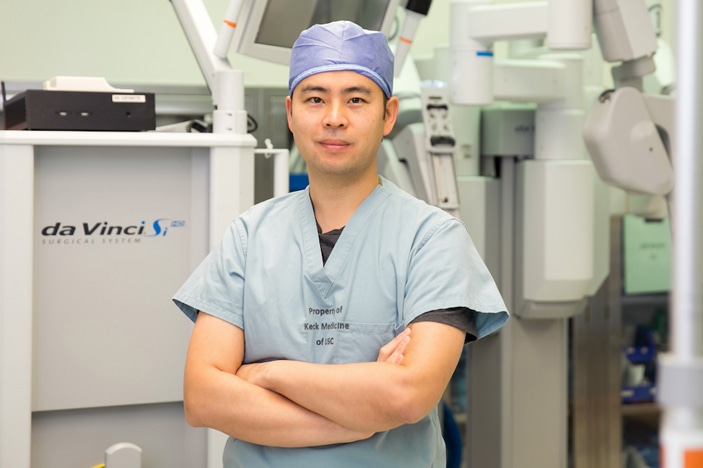Dec 12 2017
A new study carried out by Keck Medicine of USC discovers that data obtained from a unique recorder can be used for objectively measuring a surgeon’s proficiency in robotic-assisted prostate cancer surgery.
 Credit: Keck Medicine of USC
Credit: Keck Medicine of USC
It is probably a known fact that a surgeon uses the most recent minimally invasive technology for a surgery, but how does one know if they have mastered it? In order to help answer that question, researchers from Keck Medicine of USC explored a custom recording tool, which was much like a flight recorder on an airplane with regard to its concept. When joined to a robotic surgery system during radical prostatectomy procedures, the most regular treatment for prostate cancer, the “black box” recorder was able to capture data capable of being used for discerning the differentiation between novice and expert surgeons. The January 2018 issue of the Journal of Urology will feature the results of this study.
Robotic surgery has been widely adopted by urologic surgeons, but methods of assessing proficiency vary widely between institutions, in order to be credentialed by institutions to use the robotic system, surgeons must be evaluated by their peers for a handful of procedures, but the evaluations are not ongoing, and sometimes evaluators don’t agree on what constitutes proficiency.
Andrew Hung, MD, assistant professor of clinical urology at the Keck School of Medicine of USC and lead author
Developing a sustainable, objective method for analyzing surgeon proficiency and standardizing credentialing is indeed considered to be a method that will help guarantee patient safety, according to Hung.
The dVLogger, the recorder employed in the study, is capable of capturing both movement data and anonymized video. The research tool, created by Intuitive Surgical, has the potential to attach to the company’s da Vinci® Surgical System, referring to a robotic surgical platform that has been approved for general laparoscopic surgery by the U.S. Food and Drug Administration.
“The dVLogger records the surgeon’s movements, capturing where the instruments are and how the surgeon is moving the instruments,” Hung says.
Four basic prostate surgery steps were studied in order to test the recorder’s ability to measure proficiency. Data from 100 procedures carried out by both novice and expert surgeons were recorded. Results demonstrated the possibility of identifying novice and expert surgeons by measuring time in order to complete operative steps; frequency of camera movements; and distance of instrument and camera travel.
Hung states that future studies will aim at investigating how the recorded performance data compares to clinical outcomes. “We now have an opportunity to put surgeon proficiency under the microscope and see what role it plays in patient outcomes,” he says.